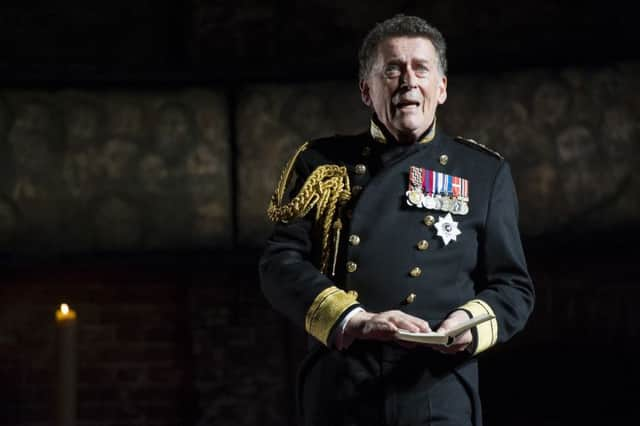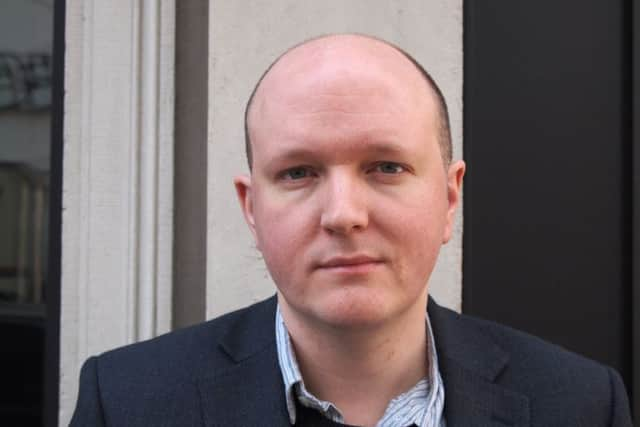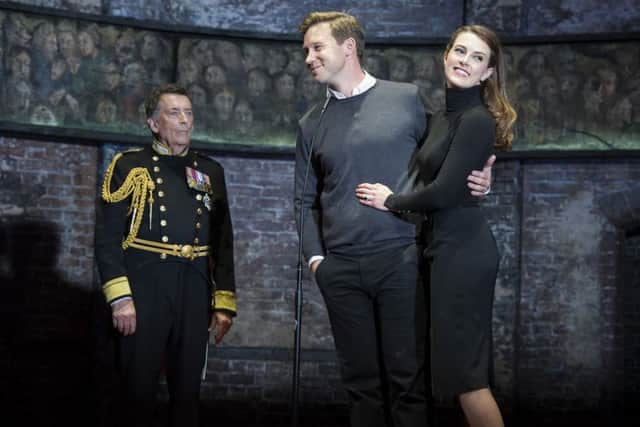What if Prince Charles became King, Mike Barlett’s play asks


Mike Bartlett is on a roll. For one thing, the writer’s five-part series, Doctor Foster, has just been a big autumn hit for the BBC. Nearly 8 million viewers shared the emotional trauma of Suranne Jones as a GP with an errant husband. One critic called it a “brilliant and gripping portrait of a marriage slowly being poisoned”.
A month or two earlier, the critic Michael Billington included Bartlett’s King Charles III in his book of The 101 Greatest Plays. That puts it in the company of Hamlet and The Crucible.
Advertisement
Hide Ad“It’s been a fantastic few months,” agrees Bartlett. “Obviously we really hoped Doctor Foster would reach an audience, but we never imagined that so many people would enjoy it. We’ve been a bit stunned. It’s everything you could hope for when you tell a story on BBC1: that it is new, interesting and popular – that’s what you’re after.”


The acclaim doesn’t stop there. When I call the playwright, he’s in New York awaiting the Broadway premiere of King Charles III, while back at home, the original production, directed by Rupert Goold, is on a post-West End tour that calls in to Edinburgh later this month. Since opening at London’s Almeida Theatre last year, it has raked in an Olivier Award, a Critics Choice Award and a South Bank Sky Arts Award.
“I had a text from a friend who said, ‘When does this stuff go to your head,’” he laughs.
One explanation for the play’s runaway success is its theme. King Charles III focuses on a topic we all have an opinion about. Set in the near future, it imagines what will happen to Prince Charles once he ascends the throne.
“Part of the fun is that every single member of the audience comes in knowing a huge amount about this subject,” he says. “They have opinions and they know about the history. The play trades on that knowledge. When William and Harry talk about what happened to their mother, we know who their mother was and the play doesn’t need to articulate that.”


Played in Edinburgh by Robert Powell, the long-time king-in-waiting must decide what kind of a monarchy is right for a 21st-century nation. Is the Royal Family an anachronism in the modern world or its presence a valuable corrective to the excesses of corporate and political power? There’s no straightforward answer, which is what makes it such a niggling subject.
Advertisement
Hide Ad“I always try to write plays about something I don’t know the answer to,” he says. “My head is telling me that the Royal Family are a bizarre and outdated monstrosity leeching off the democratic and hard-working British public. Then my heart says they’re part of the fabric of our identity, I have a weird emotional connection to them and in my heart would be sorry to see them go. So there’s a huge contradiction there within me and hopefully that’s representative of a contradiction across Britain. That’s a brilliant place to write a play.”
For these reasons, he does not take a predictable pro or anti-monarchist line. Nobody in the audience need feel excluded – even the royals themselves would be intrigued. “It’s not attempting to be provocative or cruel,” says Bartlett. “It’s trying to take the Royal Family very seriously, give them respect and investigate what their roles are in 21st-century Britain. I’ve got no desire to add to the snark and bitchiness of the world. I want to honestly and sincerely explore these public figures.”
Advertisement
Hide AdKing Charles III stands out for another reason: it is written in verse. Such an approach has been out of fashion since the theatrical experiments of TS Eliot and Christopher Fry in the early 20th century. Before that, you have to go back to the Elizabethan and Jacobean playwrights, notably one William Shakespeare, who was no slouch when it came to writing about royalty.
“Britain has some of the best Shakespearean actors in the world and a huge Shakespearean tradition which mostly as a new writer you don’t get to tap into,” says Bartlett. “Suddenly I got to play with the Shakespeare tool box and to think there would be actors like Robert Powell or Tim Pigott-Smith who would know their way around verse and bring all their skills to the part of a muscular tragic hero.”
Writing like this is easier said than done. As an actor-turned-playwright, Shakespeare was steeped in the verse tradition and could trot the lines out like they were second nature. Writing today, Bartlett had to learn the rules from scratch.
“Once you get into it, it’s very seductive to write line after line, getting into a riff about some metaphor about what the character is thinking,” he says. “You end up writing four pages on one idea. You couldn’t put that on stage; the audience would get really bored. You can see Shakespeare gets seduced by the form as well. That’s probably why we have to cut Shakespeare down a bit. The flowing verse has to be balanced with drama.”
The advantage is that the play can operate on two levels. “It allows the audience to go with the character not just through the dramatic story but also the psychological one,” he says. “It’s about using words and images to conjure up pictures which help you to understand what the character is thinking and feeling.”
But didn’t he risk unflattering comparisons with the best playwright ever? “Yes, I was very nervous and put off writing it for a very long time. Even down to the first preview at the Almeida 18 months ago, we didn’t quite know whether it was a weird experimental piece or a popular thing. Luckily it was the latter. The only thing I was very aware of was making sure that it wasn’t satirising either the Royal Family or Shakespeare. Really, the audience don’t care about the ‘Shakespearean form’ or the verse; they care about the story, the characters, the feelings and the ideas. The verse is in service to that. If you had to choose between beautiful poetry and drama, I would always go for the drama. That’s what the audience are there for.”
• King Charles III, Edinburgh Festival Theatre, Edinburgh, 16-21 November, www.edtheatres.com